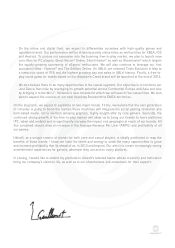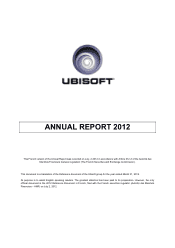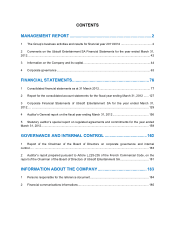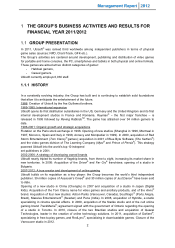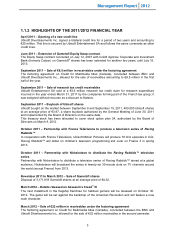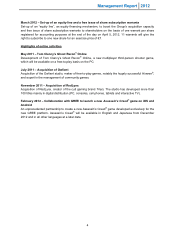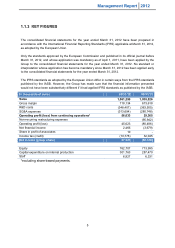Ubisoft 2012 Annual Report Download - page 7
Download and view the complete annual report
Please find page 7 of the 2012 Ubisoft annual report below. You can navigate through the pages in the report by either clicking on the pages listed below, or by using the keyword search tool below to find specific information within the annual report.
Management Report
2012
2
1 THE GROUP’S BUSINESS ACTIVITIES AND RESULTS FOR
FINANCIAL YEAR 2011/2012
1.1 GROUP PRESENTATION
In 2011, Ubisoft® was ranked third worldwide among independent publishers in terms of physical
game sales (sources: NPD, Chart-Track, GFK etc.).
The Group’s activities are centered around development, publishing and distribution of video games
for portable and home consoles, the PC, smartphones and tablets in both physical and online formats.
These games are aimed at two distinct categories of gamer:
- Habitual gamers,
- Casual gamers.
Ubisoft currently employs 6,930 staff.
1.1.1 HISTORY
In a constantly evolving industry, the Group has built and is continuing to establish solid foundations
that allow it to anticipate the entertainment of the future.
1986: Creation of Ubisoft by the five Guillemot brothers.
1989-1995: International expansion
Ubisoft opens its first distribution subsidiaries in the US, Germany and the United Kingdom and its first
internal development studios in France and Romania. Rayman® – the first major franchise – is
released in 1995 followed by Raving RabbidsTM. The game has attracted over 34 million gamers to
date.
1996-2001: Organic growth and strategic acquisitions
Flotation on the Paris stock exchange in 1996. Opening of new studios (Shanghai in 1996, Montreal in
1997, Morocco, Spain and Italy in 1998, Annecy and Montpellier in 1999). In 2000, acquisition of Red
Storm Entertainment (Tom Clancy® games); acquisition in 2001 of Blue Byte Software (The Settlers®)
and the video games division of The Learning Company (Myst® and Prince of Persia®). This strategy
powered Ubisoft into the world’s top 10 independ
ent publishers in 2001.
2002-2006: A strategy of developing owned brands
Ubisoft nearly tripled its number of flagship brands, from three to eight, increasing its market share in
new territories. In 2006: Acquisition of the Driver® and Far Cry® franchises; opening of a studio in
Bulgaria.
2007-2012: A true creator and development of online gaming
Ubisoft builds on its reputation as a key player: the Group becomes the world’s third independent
publisher. 39 million copies of Assassin’s Creed® and 30 million copies of Just Dance® have been sold
to date.
Opening of a new studio in China (Chengdu) in 2007 and acquisition of a studio in Japan (Digital
Kids). Acquisition of the Tom Clancy name for video games and ancillary products, and of the Anno®
brand. Acquisition of four new studios: Action Pants (Vancouver, Canada), Southlogic® (Porto Alegre,
Brazil), Massive Entertainment® (Sweden) and Pune (India). In 2008, acquisition of Hybride, a studio
specializing in cinema special effects. In 2009, acquisition of the Nadéo studio and of the cult online
gaming brand TrackMania®; agreement signed with the government of Ontario regarding the opening
of a studio in Toronto. In 2010, closure of the two Brazilian studios and acquisition of Quazal
Technologies, leader in the creation of online technology solutions. In 2011, acquisition of Owlient®,
specializing in free-to-play games, and RedLynx®, specializing in downloadable games. Closure of the
Vancouver studio in 2012.



